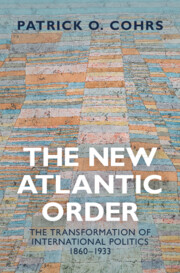Book contents
- The New Atlantic Order
- The New Atlantic Order
- Copyright page
- Dedication
- Contents
- Acknowledgements
- Abbreviations
- Maps
- Introduction
- Part I Inevitable Descent into the Abyss?
- Part II The Greatest War – and No Peace without Victory
- Part III Reorientations and Incipient Learning Processes
- Part IV No Pax Atlantica
- 14 An Impossible Peace?
- 15 Novel Superstructure of a New Atlantic Order?
- 16 No Just Peace without Security
- 17 The Eastern Frontiers – and Limits – of the New Order
- 18 A Formative Threat?
- 19 The Political and Moral Stakes of Reparations
- 20 The Imposed Peace
- 21 The Truncated Atlantic Peace Order of 1919
- Epilogue The Political Consequences of the Peace
- Bibliography
- Index
17 - The Eastern Frontiers – and Limits – of the New Order
Self-Determination, the Critical Polish-German Question and the Wider Challenges of “Reorganising” Eastern Europe
from Part IV - No Pax Atlantica
Published online by Cambridge University Press: 22 April 2022
- The New Atlantic Order
- The New Atlantic Order
- Copyright page
- Dedication
- Contents
- Acknowledgements
- Abbreviations
- Maps
- Introduction
- Part I Inevitable Descent into the Abyss?
- Part II The Greatest War – and No Peace without Victory
- Part III Reorientations and Incipient Learning Processes
- Part IV No Pax Atlantica
- 14 An Impossible Peace?
- 15 Novel Superstructure of a New Atlantic Order?
- 16 No Just Peace without Security
- 17 The Eastern Frontiers – and Limits – of the New Order
- 18 A Formative Threat?
- 19 The Political and Moral Stakes of Reparations
- 20 The Imposed Peace
- 21 The Truncated Atlantic Peace Order of 1919
- Epilogue The Political Consequences of the Peace
- Bibliography
- Index
Summary
Chapter 17 explores how far the new Atlantic order that began to take shape in 1919 could be extended to the most unsettled region after the war: the post-imperial terrain of central and eastern Europe. It reassesses how the victors sought to balance in different ways newly prominent claims of national self-determination and fundamental strategic considerations in their efforts to create a stable system of states in this region – and of how they interacted with the representatives of the numerous east European national causes. While also analysing the Czechoslovakian settlement it then focuses on the victors’ attempts to “solve” the most critical problems in this context, the Polish and the Polish-German questions. And it underscores how extremely difficult it proved to establish a viable Polish nation-state that was not from the outset divided from its more powerful German neighbour by conflicts over contested borders and minority problems. More broadly, it shows how challenging it was to establish effective mechanisms to protect the rights of German, Jewish and other minorities in the new and very heterogeneous east European states. And it elucidates that the western powers’s capacity to forge a durable new order reached distinctive limits in the east.
Keywords
- Type
- Chapter
- Information
- The New Atlantic OrderThe Transformation of International Politics, 1860–1933, pp. 717 - 764Publisher: Cambridge University PressPrint publication year: 2022



